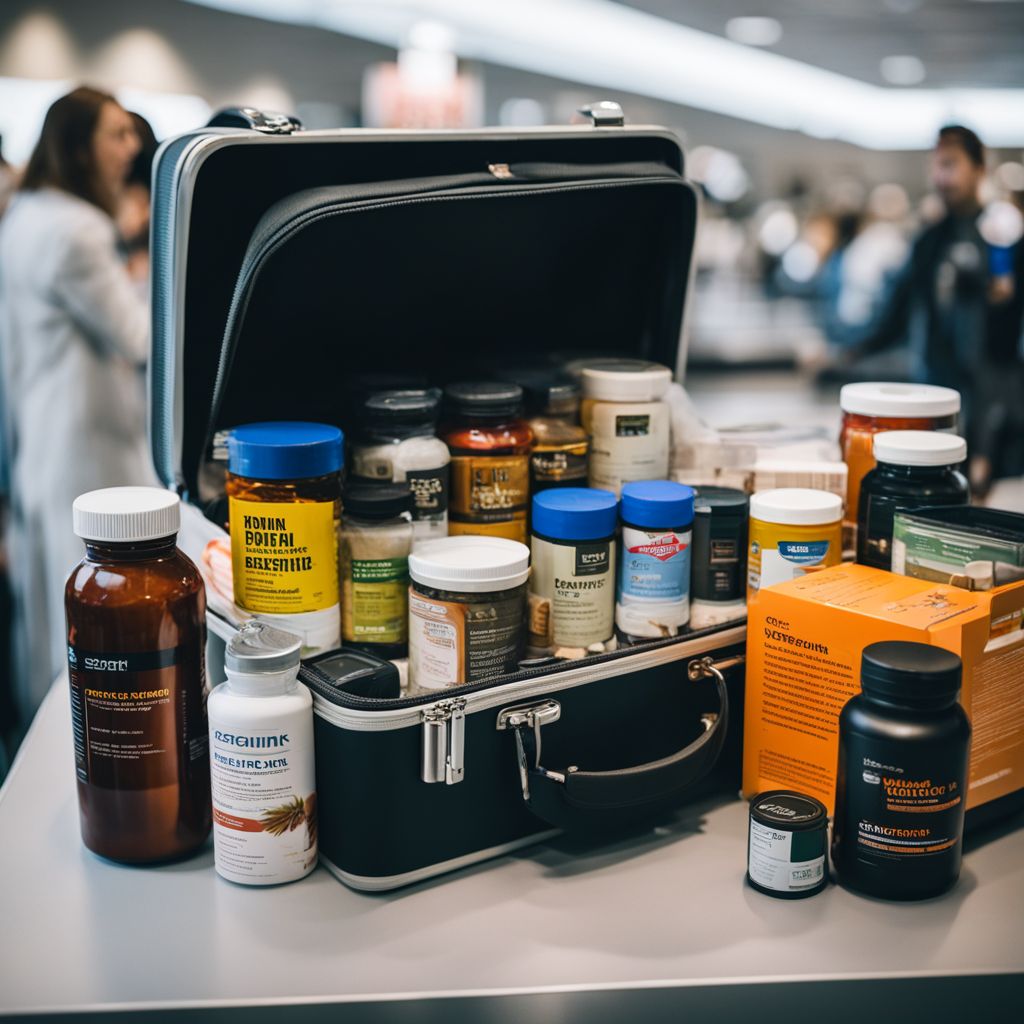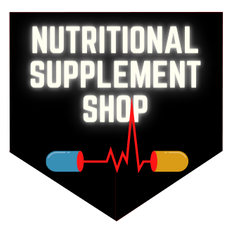
Struggling with the right dosage of Creatine and unsure how to handle it while traveling? It's interesting to note that Creatine, a popular supplement among fitness enthusiasts, can be beneficial for both physical performance and cognitive function.
Our blog is here to guide you through your optimal daily intake of Creatine, adjusting for any gastric discomfort, and even giving tips on handling Creatine during air travel. Get ready - we're about to make your health regimen simpler and more effective!
Key Takeaways
- Creatine is good for workouts and brain health. Too much can cause stomach upset.
- You can take creatine with you on a plane. Follow TSA rules to avoid problems.
- Drink lots of water with your creatine dose. This helps stop constipation or bloating.
-
Taking creatine long - term is safe. Make sure you check it often and talk to a doctor first.
- When introducing creatine it may make you pee more often.
- Creatine can be utilized by both athletes and people that do not workout.
- Creatine can be taken on an empty stomach.
- Some creatine may not completely dissolve in water. Using warm water is a trick to improve its solubility.
-
Creatine is Natty! It is a naturally occurring nutrient in meat and fish.
Understanding Creatine

Creatine, a naturally occurring substance in our bodies, plays an essential role in energy production. This section further explains how creatine functions and its benefits, particularly relating to brain health.
Function and Benefits of Creatine
Creatine is a natural substance that turns into creatine phosphate in the body. This helps make a substance called Adenosine triphosphate (ATP). ATP provides the energy for muscle contractions.
The body produces some of the creatine it uses. It also comes from protein-rich foods such as meat or fish. Taking it as a supplement is very popular among athletes and bodybuilders to gain muscle, enhance strength and improve exercise performance.
Creatine can also help with brain health by reducing fatigue and improving memory.
Creatine and Brain Health
Creatine is good for your brain. It gives energy to neurons, which boosts brain health and power. Taking creatine can improve memory. This is even more true for people who don't eat meat because they have less creatine in their system to start with.
To get the full benefits of this supplement, you should also drink lots of water and sleep well at night. Creatine comes in different types, but the best kind is known as creatine monohydrate.
Guidelines for Optimal Creatine Intake

Gain a deeper understanding of optimal creatine intake, from dosing recommendations to timing considerations. Learn how to adjust your dosage for gastric distress while enjoying all the benefits of this vital supplement.
Dive into practical and accessible advice that respects your health regimen, improving overall fitness through informed choices about creatine consumption.
Creatine Dosage Recommendations
Taking creatine helps you to stay strong. Here are some tips on how much you should take:
-
Start with a loading phase of 20 grams per day for 5 - 7 days. Split the dose into four parts.
-
After the loading phase, cut down to 3 - 5 grams per day. This is the maintenance phase.
- You can skip the loading phase and just take 3-5 grams per day from the start.
- The right dose depends also on your body weight and fitness goals.
- You do not have to stop taking creatine after a certain time.
When to Take Creatine
You can have creatine at any time. It works well no matter when you take it. Some people like to have it before they work out. Others take it after their exercise. The best plan is to take creatine every day.
Do this, and your body will always have a good supply of creatine ready for use during workouts. Also, make sure you drink lots of water with your creatine!
Adjusting Dosage for Gastric Distress
Creatine can upset your belly. To avoid this, try taking a small amount at first. This lets your body get used to it. You can then raise how much you take bit by bit. Keep an eye on how your body feels while doing this.
Every person's body is different, so what works for one may not work for another. Drinking plenty of water also helps with the stomach upset caused by creatine use during workout sessions.
Is creatine natty?
This is a frequently asked question within the realms of fitness and bodybuilding communities. For those unfamiliar, 'natty' is a slang term that essentially means 'natural.'
Creatine, to address the inquiry, is indeed a naturally occurring compound. It's found in small amounts in foods like red meat and fish. Our bodies also produce creatine in the liver, kidneys, and pancreas. When people refer to creatine supplements, they are often referring to synthesized forms that mimic the natural molecule. So, while the supplements themselves are manufactured, the compound they provide mirrors what can be found or produced naturally in the body.
Creatine and Air Travel

This section will delve into the specifics of handling creatine during air travel, discussing whether it's permissible to bring along and how best to pack it in checked luggage. We'll address common concerns around airport security check procedures for carrying such supplements, while also providing safety measures when traveling with creatine on board a plane.
Can You Bring Creatine on a Plane?
Yes, you can bring creatine on a plane. You must follow rules set by the TSA for carry-on luggage. The TSA allows both carry-on and checked bags to have creatine. A bag that you keep with you should have no more than 12 ounces or 350 ml of creatine in it.
Pack bigger amounts of creatine in your checked luggage. For easy screening at security checkpoints, put your creatine pot inside a clear zip-top bag in your hand luggage. This is also true for international flights.
So feel free to take your favorite fitness supplement wherever you travel!
Packing Creatine in Checked Luggage
It is simple to pack Creatine in checked luggage. Here are some tips:
- Try to keep the Creatine in its original packing. If it is unopened, it will not cause any concerns.
- If the original packing is not there, put it in a medium-sized pouch. A see-through bag works best.
- Make sure the pouch is clearly labeled. This helps clear up any confusion at customs.
-
Follow TSA rules for non - essential powders. Any amount over 12 ounces or 350 ml should go into checked luggage.
- Handle the product with care to avoid breakage. Use protective material around the container if needed.
- Be aware of rules in other countries as well when traveling abroad.
- Inform security if you need your Creatine and other medications to avoid extra checks.
Potential Side-effects and Safety Measures

This section will explore the possible side effects of creatine use, such as bloating and constipation, offering tips on avoiding gastric distress. We'll delve into the safety measures for long-term usage of creatine and how to ensure your health regimen supports optimal results without adverse effects.
The discussion will also cover hydration levels, fiber-rich foods in diet, determining dosages that suit individual tolerance levels, understanding the role of a proper loading phase in reducing side-effects and managing water intake to counter potential fluid retention issues caused by Creatine supplementation.
Does Creatine Cause Constipation and Bloating?
Yes, creatine can lead to stomach upset. Constipation and bloating are two common issues. This happens when you take in too much creatine at once. It does not dissolve well in your body.
So, the leftover part may cause trouble in your gut. This leads to constipation or a feeling of fullness called bloating. Drinking lots of water with your creatine dose helps reduce these problems.
Tips to Avoid Gastric Distress
Taking Creatine can sometimes upset your stomach. Yet, there are ways to stop this. Here are some tips:
- Drink a lot of water each day.
- Eat food with lots of fiber. This helps your gut stay healthy.
- Don't take too much Creatine at once.
- Be sure that the Creatine dissolves well in water before you drink it.
- Check how much fluid you hold in your body due to Creatine use.
- If you feel sick after taking Creatine, cut back on the amount you use.
Long-term Use of Creatine
Creatine is safe to use for a long time. But you need to check it often. Some people might get kidney or liver problems from taking too much creatine. If this happens, the dose should be cut down.
You can avoid most side effects by drinking lots of water and not taking too much at once. Talk to a doctor before starting any new supplement plan. This helps make sure your health stays good while using creatine over the long term.
Does Creatine Dissolve in Water?
Creatine, specifically creatine monohydrate, doesn't dissolve entirely in water. You might notice some residue settling at the bottom of your glass after stirring it. To get the best mix, it's recommended to use warm water and ensure you drink the entire serving, including any undissolved particles, as they still provide benefits.
Creatine While Breastfeeding
Consultation with a healthcare provider is essential before taking any supplement while breastfeeding. While creatine is naturally occurring in the body and in various foods, the effects of supplemental creatine on breastfeeding infants have not been extensively researched. It's best to be cautious and discuss any potential risks and benefits with your doctor.
Can You Take Creatine on an Empty Stomach?
Yes, you can take creatine on an empty stomach. Some people report no issues when consuming it this way, while others might experience stomach discomfort. It often boils down to personal preference and tolerance. If you experience discomfort, consider taking it with a meal or snack.
Can You Take Creatine Without Working Out?
Absolutely. While it's popular among athletes and gym-goers for its benefits in muscle energy production and performance, creatine can also be taken by those not engaging in high-intensity workouts. It still offers cognitive benefits and might support overall health. However, the noticeable effects in terms of muscle volume might be less prominent if not paired with resistance training.
Does Creatine Make You Pee More?
Creatine can cause an increase in water retention within your muscles, especially during the loading phase. This can lead to a slight increase in body weight. As your body adjusts to the creatine, it might lead to increased urination initially. Staying hydrated is crucial, so make sure to increase your water intake accordingly.
Conclusion
Creatine is a helpful supplement for workouts and brain health. Knowing how to take it right helps avoid upset stomachs. Traveling with Creatine can be easy if you know TSA rules. Keep your lifestyle active, healthy, and on-the-go with the right use of Creatine!
When taking creatine or any supplement, it's always essential to listen to your body, start with the recommended doses, and adjust based on how you feel. As with any dietary supplement, seeking advice from a healthcare provider is always the best approach, especially if you have specific health concerns or conditions.
FAQs
1. What can I do to prevent gastric distress from creatine intake?
To avoid digestive system issues from creatine, you may want to stick with the recommended dose, avoiding the creatine loading phase. Undissolved creatine might cause problems too.
2. Can I carry my Creatine and other fitness supplements while traveling on board?
Yes, you can bring your Creatine capsules and protein powder for plane travel. But remember that all powders in your carry-on must follow TSA liquid rule.
3. Does taking creatine affect overall health or gym workouts?
Creatine gives energy carrier to our cells which helps boost athletic performance and muscle growth during gym workouts without harming liver or kidney function.
4. How does Creatine help brain function?
Creatine carries high-energy phosphate groups which play a key role in brain function like cognitive improvements and it also reduces oxidative stress in the brain protecting against Alzheimer's and Parkinson's disease.
5. Are there any side effects of taking excess of Creatinie?
Taking more than prescribed Creantine doses might result in dehydration, muscle cramps or weight gain hence it is advised to stick on with what is suggested by experts like Andrew Huberman who are pioneers neuroscience field.
6. Can I take other prescribed medicines or vitamins along with Creatinine?
Yes,you can take prescribed medicines like Tylenol, Advil or Ibuprofen alongwith Vitamins D,EPA etc as they have different roles in promoting overall health including mood elevation,muscle recovery,sleep supplements but make sure they do not interfere with each other so always consult a specialist before doing so.









